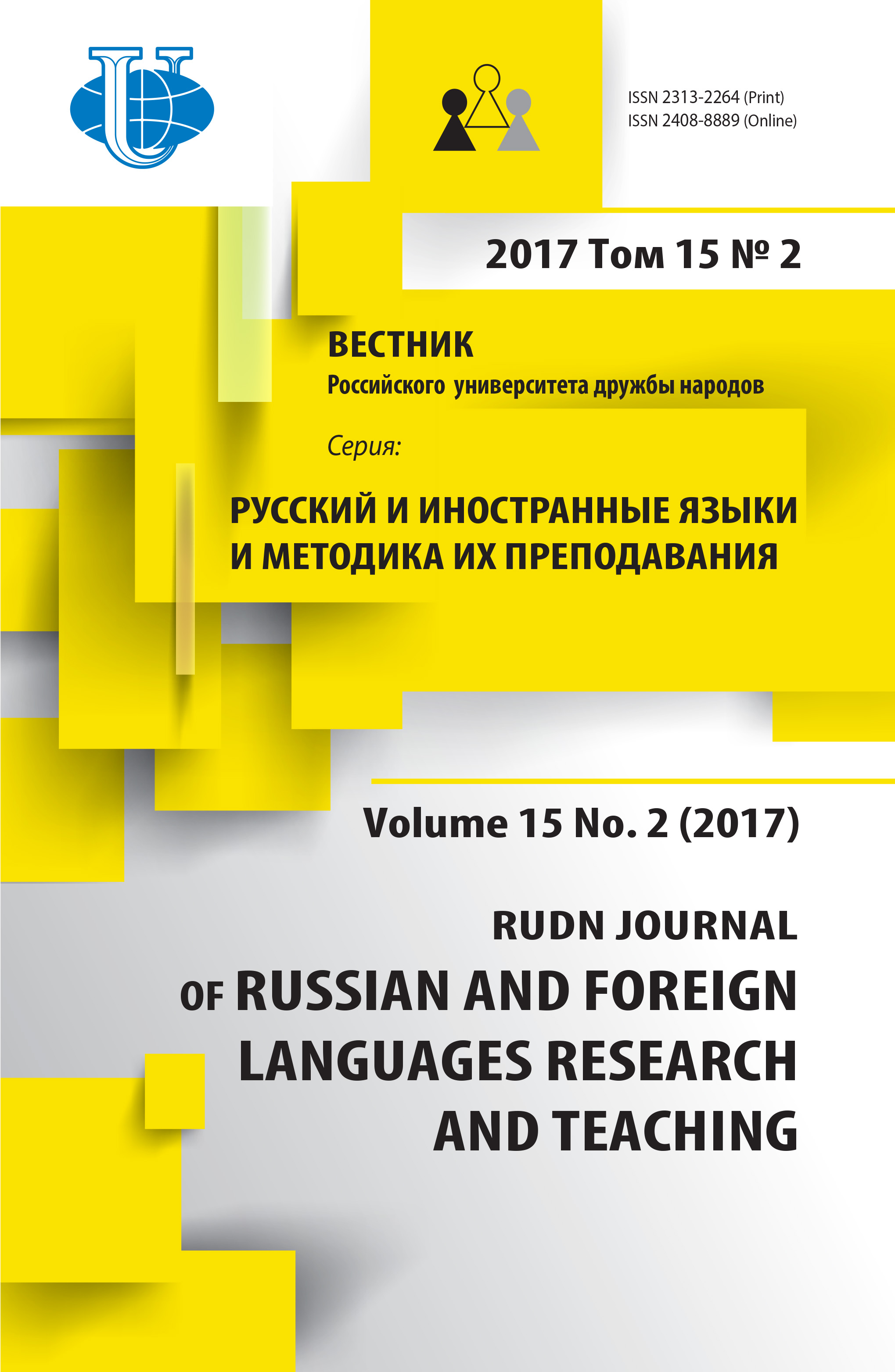BASIC NOTIONS OF LINGUOCULTURAL ANALYSIS
- Authors: Fatkullina F.G.1
-
Affiliations:
- Bashkir State University
- Issue: Vol 15, No 2 (2017)
- Pages: 175-188
- Section: Articles
- URL: https://journals.rudn.ru/russian-language-studies/article/view/16196
- DOI: https://doi.org/10.22363/2313-2264-2017-15-2-175-188
- Retraction date: 19.03.18
- Retraction reasons description:
The journal's editor retracted the article in accordance with the author’s application and the results of further investigation of the article in the aspect of borrowing ethics by the following reasons: not all the authors of the article have been indicated, there was abuse of I.R. Saitbattalov’s author rights, the materials of I.R. Saitbattalov’s dissertation have been used in the article in the form of direct copying of text fragments without indicating the authentic source in the reference list.
Cite item
Full Text

Abstract
The article represents the attempt to consider and comprehend methodological and conceptual notions, the definition and selection of which faces every researcher in the process of linguistic and cultural analysis of a text. It focuses on such key concepts as language, culture, language personality, linguistic worldview, cultural specificity, cultural code, concept, conceptual sphere, mythologem, etc. Despite numerous studies devoted to these realia, some aspects still require clarification and additional theoretical reasoning. The aim of the research in the article is also the study of sociocultural and linguistic trends of the formation of the national linguistic identity in the framework of intercultural communication and the characteristic of the features of the linguistic worldview of an individual.Based on the results of the study there is a conclusion that cultural linguistics is a scientific paradigm with a developed conceptual basis and definite categorical notion.
About the authors
Flyuza Gabdullinovna Fatkullina
Bashkir State University
Author for correspondence.
Email: fluzarus@rambler.ru
doctor of philological Sciences, professor, head of the chair of Russian and comparative philology in the department of Bashkir Philology and journalism of the Bashkir State University
Zaki Validi str., 32, Ufa, Russia, 450076References
- Shaklein V.M. Lingvokul’turologiya: tradicii i innovacii: monografiya. M.: Flinta, 2012. 301 s. (In Russ.)
- Maslova V.A. Lingvokul’turologiya: ucheb. posobie dlya studentov vysshih uchebnyh zavedenij. M.: Izdatel’skij centr «Akademiya», 2001. 208 c. (In Russ.)
- Vorob’ev V.V. Lingvokul’turologiya: monografiya. M.: RUDN, 2014. 336 c. (In Russ.)
- Lingvisticheskij ehnciklopedicheskij slovar’ / Gl. red. V.N. Yarceva. M.: Sov. ehnciklopediya, 1990. 685 s. (In Russ.)
- Thorik V.I., Fanyan N.Yu. Lingvokul’turologiya i mezhkul’turnaya kommunikaciya: ucheb. posobie. 2-e izd. M.: GIS, 2006. 260 s. (In Russ.)
- Sepir E.H. Status lingvistiki kak nauki // Sepir E.H. Izbrannye trudy po yazykoznaniyu i kul’turologii. Perevody s anglijskogo pod redakciej i s predisloviem doktora filologicheskih nauk prof. A.E. Kibrika. 2-e izd. M.: Izdatel’skaya gruppa «Progress», 2001. S. 259—265. (In Russ.)
- Filosofskij slovar’ / pod red. I.T. Frolova. 5-e izd. M.: Izdatel’stvo politicheskoj literatury, 1987. 592 s. (In Russ.)
- Triandis G.K. Nazvanie: Kul’tura i social’noe povedenie: ucheb. posobie / per. V.A. Sosnin. M.: FORUM, 2007. 384 s. (In Russ.)
- Ehko U. Imya rozy. Detektiv. Vyp. 2. M.: Knizhnaya palata, 1989. 496s. (In Russ.)
- Hrolenko A.T. Osnovy lingvokul’turologii: ucheb. posobie. 4-e izd. M.: Flinta: Nauka, 2008. 184 s. (In Russ.)
- Persidsko-russkij slovar’: v 2-h t. Svyshe 60000 slov. 3-e izd., stereotip. T. 1. Ot آ do ژ. M.: Rus. yaz., 1985. 800 s. (In Russ.)
- Zinov’eva E.I., Yurkov E.E. Lingvokul’turologiya: uchebnik. SPb.: Izd-vo «Osipov», 2006. 260 s. (In Russ.)
- Plank M. Edinstvo fizicheskoj kartiny mira. M.: Nauka, 1966. 288 s. (In Russ.)
- Ehjnshtejn A. Vliyanie Maksvella na razvitie predstavlenij o fizicheskoj real’nosti // Sobranie nauchnyh trudov. T. 4. M., 1967. S. 136—140. (In Russ.)
- Kornilov O.A. Yazykovye kartiny mira kak proizvodnye nacional’nyh mentalitetov: ucheb. posobie. 3-e izd., ispr. M.: KDU, 2011. 350 s. (In Russ.)
- Kramsch C. Language and Culture. Oxford University Press, 1998.
- Fatkullina F.G., Sulejmanova A.K. Yazykovaya kartina mira kak sposob konceptualizacii dejstvitel’nosti. Vestnik BashGU. 2011. T. 16. № 3(1). S. 1002—1005. (In Russ.)
- Stepanov Yu.S. Konstanty. Slovar’ russkoj kul’tury. Opyt issledovaniya. M.: Shkola «Yazyki russkoj kul’tury», 1997. 824 s. (In Russ.)
- Arutyunova N.D. Vvedenie // Logicheskij analiz yazyka. Mental’nye dejstviya. M.: Nauka, 1993. S. 3—6. (In Russ.)
- Fatkullina F.G. Typology of concepts in modern linguistics // Pedagogicheskij zhurnal Bashkortostana. 2015. № 1 (15). S. 239—243.
- Wierzbicka A. Cross-Cultural Pragmatics: The Semantics of Human Interaction. 2-nd edition. Berlin, New York: Mouton de Gruyter, 2003.
- Popova Z.D., Sternin I.A. Ponyatie «koncept» v lingvisticheskih issledovaniyah. Voronezh: Izdvo Voronezh. un-ta, 2000. 30 s. (In Russ.)
- Teliya V.N. Pervoocherednye zadachi i metodologicheskie problemy issledovaniya frazeologicheskogo sostava yazyka v kontekste kul’tury // Frazeologiya v kontekste kul’tury / Otv. red. V.N. Teliya. M.: Yazyki russkoj kul’tury, 1999. S. 13—24. (In Russ.)
- Vlahov S., Florin S. Neperevodimoe v perevode / pod red. Vl. Rossel’sa. M.: Mezhdunarodnye otnosheniya, 1980. 344 s. (In Russ.)
- Keren’i K., Yung K.G. Vvedenie v sushchnost’ mifologii // Yung K.G. Dusha i mif: shest’ arhetipov. M., 1997. S. 11—210. (In Russ.)
- Komarova Z.I. Tekhnologiya nauchnyh issledovanij v sistemnoj metodologii sovremennoj lingvistiki. Ekaterinburg: Izd-vo UrGPU, 2016. 209 s. (In Russ.)















